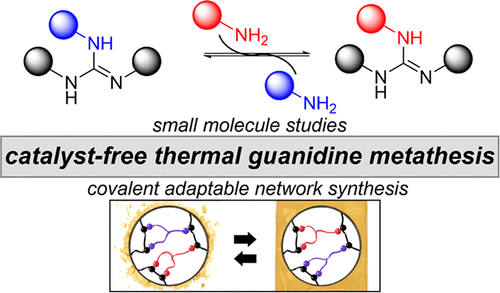当前位置:
X-MOL 学术
›
ACS Macro Lett.
›
论文详情
Our official English website, www.x-mol.net, welcomes your
feedback! (Note: you will need to create a separate account there.)
Thermal Guanidine Metathesis for Covalent Adaptable Networks
ACS Macro Letters ( IF 5.1 ) Pub Date : 2020-06-11 , DOI: 10.1021/acsmacrolett.0c00352 Alberto J Melchor Bañales 1 , Michael B Larsen 1
ACS Macro Letters ( IF 5.1 ) Pub Date : 2020-06-11 , DOI: 10.1021/acsmacrolett.0c00352 Alberto J Melchor Bañales 1 , Michael B Larsen 1
Affiliation

|
We demonstrate that a dynamic chemical reaction that we term thermal guanidine metathesis (TGM) can serve as the basis for covalent adaptable network (CAN) materials. CANs are a class of cross-linked polymers that transition from thermoset to thermoplastic-like rheological behavior upon significant activation of reversible exchange reactions within the network and thus can be reprocessed. Small molecule studies indicate the TGM reaction proceeds by a dissociative mechanism, and guanidine-cross-linked network polymers can be reprocessed at elevated temperature. These TGM-based CANs exhibit dynamic behavior, such as dissolution in the presence of monofunctional exchange partners and stress relaxation above Tg. Additionally, differences in the activation energies obtained by small molecule kinetic studies and stress relaxation analysis are consistent with key predictions of the Semenov–Rubinstein model of thermoreversible gelation of highly cross-linked networks.
中文翻译:

共价适应性网络的热胍复分解
我们证明了我们称之为热胍复分解 (TGM) 的动态化学反应可以作为共价适应性网络 (CAN) 材料的基础。CAN 是一类交联聚合物,当网络内的可逆交换反应显着激活时,它们会从热固性转变为类似热塑性塑料的流变行为,因此可以进行再加工。小分子研究表明,TGM 反应通过解离机制进行,胍交联的网络聚合物可以在高温下进行再加工。这些基于 TGM 的 CAN 表现出动态行为,例如在存在单功能交换伙伴的情况下溶解和高于T g的应力松弛. 此外,通过小分子动力学研究和应力松弛分析获得的活化能差异与高度交联网络的热可逆凝胶化 Semenov-Rubinstein 模型的关键预测一致。
更新日期:2020-07-21
中文翻译:

共价适应性网络的热胍复分解
我们证明了我们称之为热胍复分解 (TGM) 的动态化学反应可以作为共价适应性网络 (CAN) 材料的基础。CAN 是一类交联聚合物,当网络内的可逆交换反应显着激活时,它们会从热固性转变为类似热塑性塑料的流变行为,因此可以进行再加工。小分子研究表明,TGM 反应通过解离机制进行,胍交联的网络聚合物可以在高温下进行再加工。这些基于 TGM 的 CAN 表现出动态行为,例如在存在单功能交换伙伴的情况下溶解和高于T g的应力松弛. 此外,通过小分子动力学研究和应力松弛分析获得的活化能差异与高度交联网络的热可逆凝胶化 Semenov-Rubinstein 模型的关键预测一致。











































 京公网安备 11010802027423号
京公网安备 11010802027423号